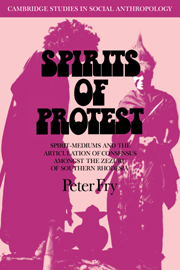 Spirits of Protest
Spirits of Protest Published online by Cambridge University Press: 08 March 2010
This book has been concerned with the sociology of spirit-mediumship at various levels of social structure ranging from the role of low-level mediums in village politics through the internal power politics of high-level mediums to their role in the Shona Rebellion of 1896–7.
However, while the spirit-mediums of Chiota were engaged in the internal politics of the villages and the wider community, they were also involved in the conflict between black and white that dominated all Southern Rhodesia. Structurally opposed to Christianity and symbolic of African tradition, the spirit-mediums proliferated in Chiota Tribal Trust Land as a spontaneous religious reaction to a situation of head-on conflict between black and white nationalisms.
The development of African protest in Southern Rhodesia
Six years after the arrival of the British South Africa Company in Southern Rhodesia in 1890, first the Ndebele and then the Shona of central Mashonaland rose up in rebellion against the white settlers. Both the rebellions were inspired by religious leaders, in the case of the Ndebele by the Karanga Mwari cult and in the case of the Shona by certain of their spirit-mediums.
Ranger's account of the Shona Rebellion makes it clear that it was a response to a series of grave deprivations. The Shona had suffered from drought, an attack of rinderpest which had decimated their herds of cattle and also a plague of locusts which had attacked their crops. Furthermore they had lost their political autonomy to the British South Africa Company which had set up an administration and imposed a Hut Tax in 1893.
To save this book to your Kindle, first ensure [email protected] is added to your Approved Personal Document E-mail List under your Personal Document Settings on the Manage Your Content and Devices page of your Amazon account. Then enter the ‘name’ part of your Kindle email address below. Find out more about saving to your Kindle.
Note you can select to save to either the @free.kindle.com or @kindle.com variations. ‘@free.kindle.com’ emails are free but can only be saved to your device when it is connected to wi-fi. ‘@kindle.com’ emails can be delivered even when you are not connected to wi-fi, but note that service fees apply.
Find out more about the Kindle Personal Document Service.
To save content items to your account, please confirm that you agree to abide by our usage policies. If this is the first time you use this feature, you will be asked to authorise Cambridge Core to connect with your account. Find out more about saving content to Dropbox.
To save content items to your account, please confirm that you agree to abide by our usage policies. If this is the first time you use this feature, you will be asked to authorise Cambridge Core to connect with your account. Find out more about saving content to Google Drive.